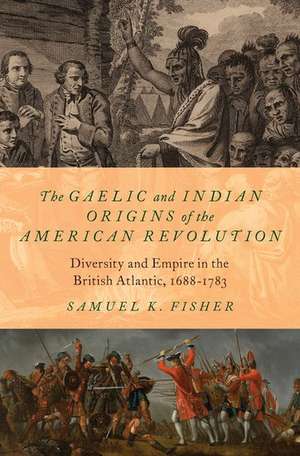The Gaelic and Indian Origins of the American Revolution: Diversity and Empire in the British Atlantic, 1688-1783
Autor Samuel K. Fisheren Limba Engleză Hardback – 13 oct 2022
Preț: 280.29 lei
Preț vechi: 306.81 lei
-9% Nou
Puncte Express: 420
Preț estimativ în valută:
53.65€ • 58.30$ • 45.10£
53.65€ • 58.30$ • 45.10£
Carte disponibilă
Livrare economică 20-26 martie
Livrare express 15-21 martie pentru 69.83 lei
Preluare comenzi: 021 569.72.76
Specificații
ISBN-13: 9780197555842
ISBN-10: 0197555845
Pagini: 336
Ilustrații: 20 black and white halftones
Dimensiuni: 238 x 161 x 29 mm
Greutate: 0.73 kg
Editura: Oxford University Press
Colecția OUP USA
Locul publicării:New York, United States
ISBN-10: 0197555845
Pagini: 336
Ilustrații: 20 black and white halftones
Dimensiuni: 238 x 161 x 29 mm
Greutate: 0.73 kg
Editura: Oxford University Press
Colecția OUP USA
Locul publicării:New York, United States
Recenzii
This book is an historical tour de force. With a wonderful comparative focus on indigenous nations of North America and Scottish and Irish Gaels, Samuel Fisher has not only provided fresh perspectives on the American Revolution but also on the transatlantic movement of peoples from the British Isles in the eighteenth century.
In 1776, the British Empire was a diverse, multinational dominion, but it was also a dominion run by — and almost exclusively for the benefit of — British, Irish, and Anglo-American Protestants. In this important, wide-ranging book, Samuel K. Fisher shows how unresolved questions over the place of Irish Catholics and Native Americans within Britain's eighteenth-century empire helped drive the conflicts that tore that empire apart. The result is a new and compelling account of the American Revolution's origins.
Samuel Fisher looks to British, rather than purely English, history to explain why the elite in thirteen of Britain's American colonies decided suddenly in the 1770s that the imperial government had become oppressive and must be rejected. In this provocative and timely book, Fisher demonstrates how the attempt by George III to include Native Americans within his empire proved as offensive to 'exclusionary patriots' as had the actions of James II in treating Scottish Highlanders and Irish Catholics as equals with his Protestant subjects in the three kingdoms.
With a long view and an Atlantic perspective, Samuel Fisher explains how Irish Catholics, Scottish Highlanders, and American Indians reshaped the British Empire, and in doing so helped bring about the American Revolution. Thoughtfully and systematically considering empire, revolution, and nation-building in terms of inclusion and exclusion, this book challenges easy assumptions about tyranny and freedom in the eighteenth century and about the kind of society American revolutionaries created.
The Gaelic and Indian Origins of the American Revolution is a refreshing work of intellectual history... Fisher has read and interrogated primary sources and secondary literature with diligence and care. In doing so, he has offered eighteenth-century historians an invitation to revisit the structures of colonial rule in North America as well as the reasons behind the eruption of the American War of Independence.
In 1776, the British Empire was a diverse, multinational dominion, but it was also a dominion run by — and almost exclusively for the benefit of — British, Irish, and Anglo-American Protestants. In this important, wide-ranging book, Samuel K. Fisher shows how unresolved questions over the place of Irish Catholics and Native Americans within Britain's eighteenth-century empire helped drive the conflicts that tore that empire apart. The result is a new and compelling account of the American Revolution's origins.
Samuel Fisher looks to British, rather than purely English, history to explain why the elite in thirteen of Britain's American colonies decided suddenly in the 1770s that the imperial government had become oppressive and must be rejected. In this provocative and timely book, Fisher demonstrates how the attempt by George III to include Native Americans within his empire proved as offensive to 'exclusionary patriots' as had the actions of James II in treating Scottish Highlanders and Irish Catholics as equals with his Protestant subjects in the three kingdoms.
With a long view and an Atlantic perspective, Samuel Fisher explains how Irish Catholics, Scottish Highlanders, and American Indians reshaped the British Empire, and in doing so helped bring about the American Revolution. Thoughtfully and systematically considering empire, revolution, and nation-building in terms of inclusion and exclusion, this book challenges easy assumptions about tyranny and freedom in the eighteenth century and about the kind of society American revolutionaries created.
The Gaelic and Indian Origins of the American Revolution is a refreshing work of intellectual history... Fisher has read and interrogated primary sources and secondary literature with diligence and care. In doing so, he has offered eighteenth-century historians an invitation to revisit the structures of colonial rule in North America as well as the reasons behind the eruption of the American War of Independence.
Notă biografică
Samuel K. Fisher is Assistant Professor of History at the Catholic University of America. He is the co-editor of Bone and Marrow/Cnámh agus Smior: An Anthology of Irish Poetry from Medieval to Modern.
